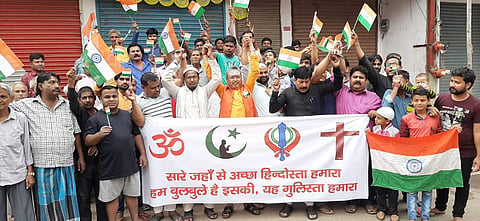

I am indeed happy that a festering issue has been addressed, adjudicated and brought to rest by the five-member bench of the Supreme Court chaired by Chief Justice of India Justice Ranjan Gogoi. It’s a fair job and the sensitivity with which it has been handled and the decisions that have been made revalidate the principles of law that is fair and equitable.
It is an emotional moment for me, involved as I have been since the beginning as a member of the Shri Ram Janmabhoomi Nyas Board, that a dream has been realized. At the same time, I am doubly satisfied that much of the arguments that I advanced through my two books: Ayodhya Revisted and ‘Ayodhya: Beyond Adduced Evidence,’ have stood scrutiny in the SC verdict.
The highlight of the judgment to my mind is that the idol has been accepted as a deity even as the Janmasthan is not. The court’s order making over the disputed land to the Government receiver and for the Centre to frame the rules to float a trust, which in turn will plan the temple construction, is a sound move.
Incidentally, the SC order replicates the model of the disputed Somnath Temple land, which after being taken over from the Junagadh Nawab was administered by the State of Saurashtra under orders from then Home Minister, Sardar Vallabhbhai Patel, who created a trust to run it. To that extent, there is a precedent too! The title of the land remained with Saurashtra.
It’s not the issue here to hark back on who demolished the place to build a masjid. Or who did the masjid away. As the Supreme Court has pointed out, it’s plainly a matter of belief, faith and evidence. The common belief that the temple was demolished by Babur is erroneous as is the notion that he was a fanatic and opposed to religious tolerance.
Law being evidence-based, I believe the court has given proof as much legal space as it deserved. Whatever the Archaeological Survey of India could put on the table to sustain the argument for a temple has been acknowledged.
While not hoping to err on the side of too much caution, I would wish that the parties which look upon the verdict as a loss and are mulling a judicial review will not exercise this option. The judgment has brought some calm to our fair country.
A judicial review is indeed a right available to any party whose feelings have been injured. But several Muslim minds have accepted the verdict, which is bound to serve the societal cause better. It would save further pain if the debate is stopped and not lengthened since even the larger sections of Muslims accept the Hindu claim of Ayodhya being the birthplace of Lord Rama. They too hold the deity in huge respect. An insistence on a review could create fissures, which does not help any cause. Both communities today have a historical role to play for communal harmony.
Acharya Kishore Kunal
Former IPS officer, historian and member of Ram Janmabhoomi Nyas Board